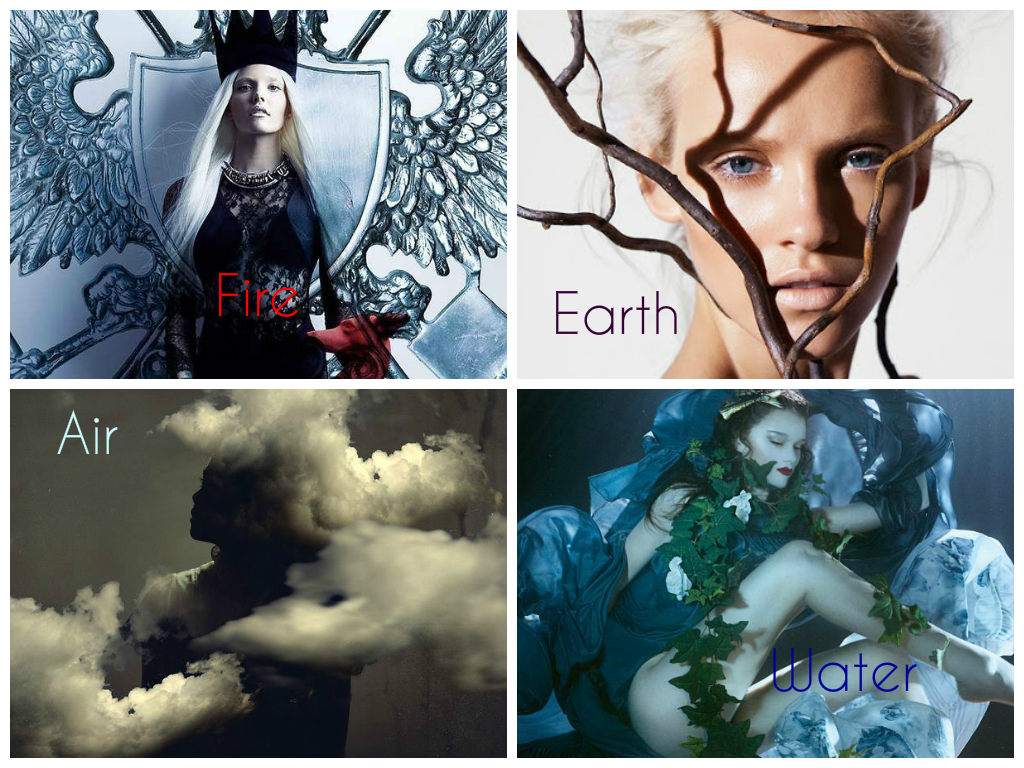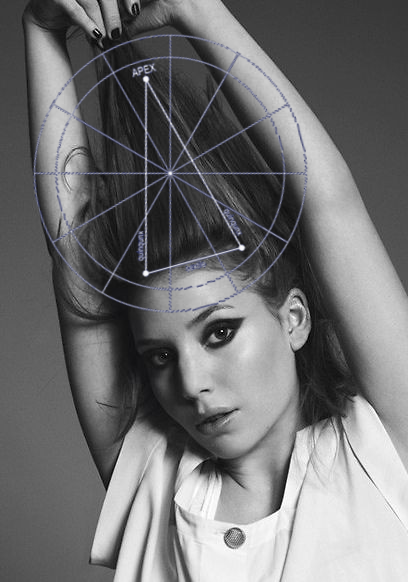
Dominant Elements and Their Shadow Lessons: The One You Don’t Want is the One You Need
 In astrology, there’s a reason we start with the basics: Earth signs are grounded, Water signs emotional, Fire passionate, Air intellectual. These are keys that unlock understanding. They’re not the whole story, but they are the start of it. When we enter into psychological astrology, the symbols live through us. It often goes beyond textbook traits and into the realm of human experience, where a person with an airy chart might find themselves swamped by emotion, or a watery one might overdevelop the mind just to stay afloat. The dominant element is what you so readily identify with—whether it be fiery passion, airy intellect, earthy steadfastness, or watery emotional depth, it is often the costume you wear best. It fits. It flatters. You learned to strut about in it early on, usually because it was your most natural fit. When life kept throwing crises your way, you responded with what you had—fire, air, water, or earth. But just because you’re good at something doesn’t mean you’re whole. This is the sneaky bit.
In astrology, there’s a reason we start with the basics: Earth signs are grounded, Water signs emotional, Fire passionate, Air intellectual. These are keys that unlock understanding. They’re not the whole story, but they are the start of it. When we enter into psychological astrology, the symbols live through us. It often goes beyond textbook traits and into the realm of human experience, where a person with an airy chart might find themselves swamped by emotion, or a watery one might overdevelop the mind just to stay afloat. The dominant element is what you so readily identify with—whether it be fiery passion, airy intellect, earthy steadfastness, or watery emotional depth, it is often the costume you wear best. It fits. It flatters. You learned to strut about in it early on, usually because it was your most natural fit. When life kept throwing crises your way, you responded with what you had—fire, air, water, or earth. But just because you’re good at something doesn’t mean you’re whole. This is the sneaky bit.
Generally speaking, your dominant element is most often determined by looking at how many of your planets fall into signs of a particular element—Fire, Earth, Air, or Water. Whichever element has the most placements is likely dominant. Now the shadow, the so-called inferior element—is where it gets juicy, and a little uncomfortable. This is the part of us we didn’t learn to use. Maybe it frightened us, or bored us, or felt alien. Life is a teacher with an infuriating lesson plan—it keeps sending us homework in the subjects we’ve failed to grasp. Again and again, until we get it. In psychological astrology, each element has an inferior counterpart: fire’s inferior is earth, earth’s is fire; air’s is water, and water’s is air.
We spend so much of our lives cultivating the qualities we’re already quite good at. The airy ones hone their wit, their intellect, their ability to rise above the fray with a clever phrase or a change of perspective. But then, just when they’re at their most elegant, life turns around and hits them with a wave of emotion so vast, so engulfing, they can’t think their way out of it. And that’s the point. Air can’t swim. Thought doesn’t float in the ocean of feeling. So life says, “You’ve had your head in the clouds long enough. Down here—into the deep.” And in they go, flailing beautifully.
That which we avoid has something vital to teach us. The inferior element isn’t a flaw—it’s an invitation. A rough-hewn doorway to a part of ourselves that hasn’t been developed, it’s isn’t because it’s unworthy, but because it’s unfamiliar. And familiarity, as you know, breeds comfort. Growth doesn’t.
Fire Types
Fire types are the ones with the spark in their eyes and the restlessness in their bones. They are instinctive, passionate, and gloriously now. They live on impulse, thrive on risk, and treat life as a stage. They leap before they look, shout before they think, and create with the kind of passion that doesn’t wait for permission. They’re the wild ones in the rhythm of existence. And then—clunk—along comes Earth. The inferior function. The one that says, “Lovely leap, but have you done your taxes?”
See, Earth is everything Fire isn’t naturally. Grounded. Patient. Cautious. Consistent. Earth doesn’t leap—it builds. It doesn’t burn—it holds. And for the Fire-dominant soul, Earth can feel like a wet blanket draped over their inner blaze. “What do you mean I have to plan?!” they cry. “Why would I wait when I could act?” But here’s the thing—life, in its irony, will always insist that they learn. And how does Earth enter the fiery life? It’s never subtle, that’s for sure. It arrives as resistance, as rules, as consequences. As the moment when the grand idea doesn’t get off the ground because the foundation was never poured. As the job that demands repetition. The relationship that wants reliability. The project that can’t run on inspiration alone. Earth doesn’t care how inspired you are—it asks, “Can you show up again tomorrow?”
Sometimes Earth shows up in human form. The Fire person falls head over heels—dramatically, passionately, operatically—for someone who is, well, boring. At first glance, anyway. They’re aren’t flashy, but they are dependable. Practical. Grounded. The kind of person who doesn’t just dream about the cottage in the woods—they budget for it, get the permits, and build it. And the Fire person, so used to running on heat and hope, finds themselves simultaneously maddened and mesmerized. “Why are you not excited all the time?!” they demand. And Earth responds, “Because I’m building something that lasts.”
This kind of relationship—or even this kind of life challenge—isn’t easy for Fire. Earth feels like slowness, like limitation. But it’s not here to dull Fire. It’s here to give it form. To make the spark into something that endures. Fire alone can burn out. When a Fire person begins to integrate Earth, they don’t lose their edge. They gain roots. They start finishing what they start. They learn to channel their energy instead of spraying it in all directions. They learn patience. They stop burning out and start burning steady.
So if you, a fiery soul, are suddenly faced with repetition, responsibility, or someone who insists you slow down and do it properly—don’t rebel too quickly. It’s Earth, knocking at your door. It’s trying to tame you, but it’s also trying to help you last.
Beyond the blazing romances and the eye-roll-inducing practical partners, what are the earthy experiences—the unspectacular, persistent, grounding encounters—that crash into a Fire person’s life? Fire wants dragons to slay, crowds to inspire, a hill to charge up shouting something heroic. But Earth? Earth wants a garden. And for Fire, this can feel like a practical joke. “Wait, you want me to water something… every day?”
So Earth enters a Fire-dominated life with a routine. A job that’s thrilling at first, then slowly reveals itself to require patience, repetition, and tolerance. Deadlines that don’t care how passionate you are. Budgets that won’t stretch just because your idea is magnificent. Teamwork that demands you actually listen to other people. Earthy, tedious, real-world lessons that don’t light you up—they wear you in.
Then there are the moments of stillness. Life might sideline a Fire person through burnout, illness, or circumstance. It’s an invitation. “Sit down,” says Earth. “Not everything is a sprint.” And for someone who thrives on motion and momentum, this enforced pause can feel like being buried alive. But it’s in this slowness that the Fire soul starts to feel their own roots—what truly matters, not just what excites.
Failure is also an earthy teacher. This isn’t the noble kind, where you tried your best and learned something deep—but the irritating kind, where you realize you didn’t prepare. You leapt without looking and landed in a puddle. You burned out before you built the bridge. These are invitations to plan better next time. Earth teaches through consequence. There might also be encounters with responsibility that can’t be dodged or dramatized. A child. A pet. A mortgage. Something that needs you every single day, no matter how inspired you’re feeling. And in the slow grind of showing up, you discover something Fire never promised you: reliability can be predictable in a good way.
The creative dream won’t manifest on passion alone. The book demands drafts, the business requires accounting, the vision needs scaffolding. Earth says, “Your passion is the flame. Now build something to hold it.” And the Fire person learns, slowly, to become a maker, not just a spark. Earth doesn’t always arrive wearing a lover’s cologne. Sometimes it comes as a crisis in the material realm, a schedule, a hard-earned rest, or a garden that grows too slowly for your liking. But this the the point. Fire needs Earth to give it somewhere to shine for longer than a single glorious moment. Because a bonfire is beautiful, but a fire that stays lit through winter? That’s Earth.
Earth Types
The Earthy soul is deeply rooted in routines and systems and safety, will often suddenly being called to loosen the grip, to risk the precious order they’ve so carefully cultivated. These are the people who keep the lights on, the wheels turning, the calendars up to date. They’re the ones you’d trust to build the bridge—but left to their own devices, they’d never cross it unless it was properly scheduled, thoroughly inspected, and emotionally waterproof.
And then along comes life, an impish little trickster, with a wild glint in its eye. Earth is gifted at creating stability, but it can become a prison if not occasionally shaken up. There’s comfort in control, of course, but too much of it can calcify into fear: fear of the unknown, fear of mess, fear of not being in charge of every variable. So life, ever the sassy teacher, throws them into fire’s domain, to melt the rigidity, to coax out spontaneity, to see if they can move with the rhythm instead of always setting the tempo.
To take a leap without knowing the landing. To say yes before the plan is written. This isn’t a betrayal of their nature—it’s an expansion. The fire doesn’t want to destroy what’s been built; it just wants to remind the builder that the house is meant to be lived in. Joy isn’t something to schedule after productivity—it’s something that can erupt in the middle of a Tuesday, uninvited, fun, and utterly irrational. And this is how we grow. You don’t have to deny your Earthy essence, just let it be kissed by fire. Let it crack you open just enough to let a little wildness in. Can the Earth person laugh without worrying if it’s productive? Can they wander without a destination, just for the sheer thrill of wondering? This is the challenge. Because at the end of the day, what’s the point of building the castle if you never throw a party inside it?
Fire is Earth’s inferior function. Fire is passion without a plan, instinct without permission. It’s the creative spark, the raw desire, the impulse to leap before looking—and that’s precisely what makes it so unsettling to the Earth-dominant soul. For someone grounded in Earth, fire can feel reckless, even dangerous. It threatens to undo all their steady work. So it gets pushed down, ignored, labelled as “impractical” or “immature.” But of course, anything that’s repressed doesn’t disappear—it mutates. Fire, unacknowledged, might erupt as rage, restlessness, or sudden outbursts of impulsive behavior. It doesn’t go away just because Earth wants everything filed under ‘safe.’ And so life, in its wise way, intervenes. It introduces fire in subtle and not-so-subtle ways. The Earth person might find themselves falling madly in love with someone wildly inappropriate. This person is pure Fire—unpredictable, magnetic, probably a little messy, and entirely uninterested in discussing pension plans. They make terrible decisions on impulse, speak in grandiose declarations, and have no idea what “quiet night in” even means. And yet—the pull. The Earthy soul, who has spent a lifetime building things that last, finds themselves enchanted by someone who lives for the moment. Someone who might forget their birthday but would take them stargazing on a Monday just because the sky looked “particularly dramatic.” Someone who ignites them.
At first, it’s dizzying. Earth is drawn to Fire’s passion, the way they make every moment feel like a crescendo. Fire shakes Earth loose, makes them feel alive, desired, and noticed. And Earth, in turn, offers Fire a kind of safety they never knew they needed. A place to land. But make no mistake—this isn’t easy. Because while the Earth person is fantasizing about cohabitation and compatible credit scores, the Fire person is planning a spontaneous road trip to nowhere. And that’s where the real work begins. Earth wants to contain, to secure. Fire wants to expand, to escape. And Earth must learn to loosen their grip. This wildly inappropriate love isn’t a mistake. It’s a teacher. A mirror. A divine disruption. It’s Earth’s inferior function—Fire—saying, “Darling, you’ve built a lovely house. Now, shall we dance on the roof?”
And if the Earth soul is brave enough, they won’t shut it down, rationalize it away, they won’t retreat back into their sensible shell. Fire can bring something extraordinary. They learn to feel. To risk. To move. To live with a bit more fire and a bit less protocol. So the Earth person might fall madly in love with someone wildly inappropriate. But perhaps, in this glorious chaos, they don’t lose their footing—they find their soul.
Sometimes, fire enters their life in other unexpected ways—like suddenly quitting a job they’ve held for years, because something inside has caught fire and refuses to be extinguished. They might feel an unexplainable hunger for adventure, for creation, for risk. This isn’t because they’ve become someone else, but because a neglected part of them is finally demanding airtime. So when fire appears—unexpected, unruly, seductive—Earth mustn’t see it as sabotage. It is, in fact, an invitation. A dare from the universe: “You’ve mastered containment. Now can you master expression? Can you let yourself burn a little without falling apart?”
Air Types
We turn to our lofty, light-footed friends—the Air-dominant types. These are the thinkers, the talkers, the idea-spinners, the ones who treat life like an open-ended question rather than a fixed reality. They are curious, witty, and non-committal types. While others are swimming in the murky depths of feeling or grounded in the clay of practicality, Air people are up in the rafters, watching it all unfold with a knowing smirk and a well-timed pun. They live in the head. The heart? That’s a bit… messy. Enter Water. Not a splash, not a sprinkle—but a tidal wave.
See, for the Airy individual, emotion is the element that feels most alien. This isn’t because they don’t have feelings—they do, of course—but because feelings resist their favorite tools: analysis, explanation, detachment. You can’t argue with grief. You can’t logic your way out of longing. You can’t explain away your sadness. And so life sends them exactly that which they are least prepared to handle. A situation, a relationship, a breakdown—something that demands vulnerability.
Often, it arrives in the form of a person. Oh yes—just as Earth falls in love with a firebrand who throws matches at their neatly stacked woodpile, the Air sign often finds themselves inexplicably enchanted by someone who feels everything. A stormy-eyed artist. A soulful, emotionally unpredictable lover. Someone who cries during films and then wants to talk about what it means. Someone who doesn’t debate—they confess. Who doesn’t explain—they emote. And the Airy person, at first, is both captivated and completely undone. Their cool detachment meets hot tears. Their elegant theories are met with, “But how do you feel about it?” And suddenly their gliding, feather-light way of being is weighed down with the heaviness of human need.
They might try to escape it at first. Rationalize. Intellectualize. “It’s a projection.” “We’re not compatible.” “They’re too intense.” But some part of them—some part even they didn’t know existed—is stirred. Because this Watery force doesn’t just challenge them. It fills them. It makes them aware of parts they’ve long disowned: grief, longing, tenderness, vulnerability.
Air, the freedom-loving, thought-spinning, emotionally elusive spirit, attracting those very souls who wish to pin them down. You see, Air types—those blessed with wit, curiosity, and the unnerving ability to hover above emotional entanglements like hummingbirds—are magnetic precisely because they can’t be caught. They glide through life with lightness, dancing between ideas and people with the grace of someone who knows that to be attached is, perhaps, to be weighed down. And this cool autonomy, an almost imperceptible detachment—it’s catnip to the possessive and the insecure. Why? Because to someone desperate for certainty, for emotional containment, for assurance that they matter, the Air person represents both everything they crave and everything they fear. They’re fascinating. Enchanting. But maddeningly ungraspable. And so the more Air floats, the more someone prone to jealousy begins to reach. And grip. And demand. This type of watery partner will try to make Air feel more. To get answers. “Where were you?” “What did you mean by that?” “Why don’t you miss me the way I miss you?” And Air, now suffocated, starts to shrink back. This isn’t to say Air can’t be loyal or loving—they absolutely can. But their affection often takes the form of ideas shared, laughter exchanged, space honored. To those who equate love with emotional intensity or exclusivity, Air can seem evasive, even disinterested. Which stokes the fire of jealousy further. Air can attract possessive partners.
It’s what happens when the soul’s waters rise too high, too fast. And when that wave crashes into an Airy being—who is used to observing from a safe height—it’s often the first time they really have to reckon with emotion. The jealous partner can be a mirror. A living embodiment of Water, come to stir the Air person’s still, unplumbed depths. They cry when Air jokes. They ache when Air retreats. They want presence, intensity, immersion. They say things like, “I just want to know you care,” and the Air person realizes that their usual polite affections don’t quite land. Not here. Not in this watery storm.
Air, for all its gifts, can sometimes hover too far above the human mess. It knows how to discuss love but not always how to feel it. It can write an essay on heartbreak and still not cry. And life won’t let that stand forever. It sends Water—through lovers, through grief, through longing—to say, “Feel this. All of it. Even when it’s irrational. Especially when it’s irrational.” When Water crashes into the life of an Air person. It’s not always pretty, but sometimes the soul needs to drown a little in order to come alive.
Beyond romance, the Water challenge may arrive through grief, illness, or the simple act of being deeply moved. A moment of connection so profound it bypasses words. A loss that won’t be solved by insight. A dream that awakens emotion without explanation. And the Air person, with all their mental rationalizing, finds that thought alone cannot hold it. They must feel. This is not to say they become emotional wrecks or give up their gifts. It’s subtler than that. They begin to feel through the intellect. They start to realize that emotional intelligence is not opposed to mental brilliance—it is its completion. Empathy gives depth to thought. A well-timed silence can be more powerful than the cleverest retort.
So if you’re a breezy soul suddenly caught in the rain, don’t run for shelter. Stand in it. Let it soak you. The sadness? The vulnerability? The ache you can’t explain? It’s your soul remembering its own waters. And maybe, just maybe, the person you thought was “too much” is actually the one who teaches you how to feel without fear. Because without Water, Air is just wind. But with Water? It becomes the voice of the storm, the breath of life, the feeling of something eternal.
The Water Types
The watery souls are the alchemists of emotion, fluent in the unspoken, intuitive as a moonlit tide. These are the people who can hold others’ pain as if it were their own, not because they should, but because they can. Their compass is feeling, their map is memory, and they trust the subtle over the stated. While others chase what’s obvious, Water surrenders to complexity. And yet—life, teacher that it is—won’t let anyone stay submerged forever. Enter Air, the breezy, bright, slightly cold element. Where Water flows and absorbs, Air observes and analyses. Where Water feels, Air thinks. And therein lies the problem.
For the Water-dominant, Air can feel disorienting. It’s not that they don’t have thoughts—of course they do—but thought, for them, is laced with feeling, drenched in mood. To strip an idea of emotion, to dissect something without drowning in it, feels like asking a mermaid to ride a bicycle. Abstract thinking? Detached argument? Debating for fun? These things can seem, at first glance, almost cruel. “How can you argue if someone’s hurting?” the watery one might wonder. “Why would you prioritize logic over connection?”
But life, in its relentless wisdom, does not want us stuck in any one element. And so it begins to push us. A watery person may find themselves in situations where emotion won’t solve the problem. Where the question isn’t “How do you feel?” but “What do you think?” And at first, this can feel like betrayal. Like abandoning the soul’s language for the sterile syntax of reason. But it isn’t betrayal—it’s evolution. Air invites Water to translate its depths into words, to rise up from the undercurrent and see the whole ocean from above. This doesn’t mean that one has to become less feeling, but to learn to give feeling a voice that others can follow. Logic, in this light, isn’t the enemy—it’s the scaffolding that allows empathy to reach new heights.
When a Water person develops their airy side, something miraculous happens. They become the kind of communicator who doesn’t just feel the world, but helps others understand what they feel. They become therapists. Sensitive and articulate. So when life throws a little Air your way—when you find yourself being asked to write it out, talk it through, or god forbid, debate it—don’t run back into the waves. Take a breath. Use your mind. Let your emotions rise like mist and form clouds of thought. Because Water with Air? It’s rain. It’s healing. It’s life, offering you a new way to feel the world.
Air as the inferior function of Water, it is a bit of psychological alchemy. These aren’t incompatible realms, but they are profoundly different languages. The Water-dominant individual lives in the realm of feeling, intuition, and soulful resonance. They are natural empaths, absorbing the emotional weather of a room without needing it to be spelled out. They know things without knowing how they know them. It’s a depth of feeling. They swim in symbols, undercurrents, moods. They don’t just feel their own feelings; they often feel yours, mine, the cat’s, and possibly the ghost of someone who died in the building 80 years ago. So imagine their dismay when life demands crisp, clear articulation. When the tides of intuition are no longer enough and they must instead draw a diagram, state a case, speak in bullet points. Welcome to the realm of Air: objectivity, analysis, thought detached from emotion. The Water soul, when thrust into this airy realm, may flounder.
Yet, life offers growth. Because while Water understands the why of pain, Air can explain it. While Water soaks in the atmosphere, Air gives it language. And the Water-dominant person, when they begin to integrate this airy function, doesn’t become less sensitive—they become articulate. They become the ones who can translate feeling into thought, emotion into insight. They become the bridge between inner worlds and outer expression. Of course, at first it can feel alien. Asking a Water person to detach and observe can feel cruel, even dangerous. “But if I step back, will I still care?” they wonder. The answer is yes—perhaps even more so. Because detachment, in the Airy sense, isn’t coldness. It’s perspective. It’s the ability to see the whole pattern, not just the part that hurts.
Now imagine our dear Water-dominant soul: a creature of the inner world, wrapped in layers of feeling and memory. This is someone who experiences life as an emotional tide. They are soulful, sincere, soft. So what does life send to shake them up? What disruptive, exhilarating, maddening, illogical thing does the universe throw in their path? Air.
Air, with its cool detachment and irreverent charm. Air, that doesn’t want to merge—it wants to flirt, question, analyze. Air doesn’t soak in the mood; it floats above it, commenting wittily. It doesn’t say “I feel you,” it says “Interesting perspective, but have you considered…?” And suddenly, the Water person finds themselves utterly, inexplicably magnetized. It won’t be by someone who mirrors their depth—but by someone who breezes in with outrageous ideas, offhand jokes, and an irritating refusal to get emotionally tangled. This Airy being may seem maddeningly aloof, emotionally elusive, even exasperatingly rational. But they’re fascinating. Why? Because they embody everything the Water type has buried or neglected: objectivity, levity, movement, freedom from emotional gravity. Falling in love with an Airy type is like a quiet pond meeting a kite. The Water person wants to hold—the Air person wants to hover. And what a infuriating dance that becomes.
But it’s not only romantic entanglements. Air can crash into a Water person’s life in other unsettling ways. A sudden compulsion to speak in public, when they’d rather listen in private. An unexpected career in communication—writing, teaching, podcasting—where their emotions must be filtered into thought. Or perhaps, more disorienting, a phase where their feelings won’t guide them, and they must think their way through something. They’ll feel adrift at first. But over time, they learn the rhythm of reason.
Air’s arrival often looks like chaos to Water: too many ideas, too many words, too little soul. But it teaches the Water person to rise, to articulate, to stop drowning in the feeling and start finding language for it. The Airy disruption isn’t there to undo them—it’s there to refine them. And sometimes, it really is as dramatic as falling in love with a detached thinker who says things like “Let’s not label this,” or “I’m not really into deep emotional intimacy.” And the Water person’s inner ocean howls in protest, but still they stay. Because that breezy one has brought wind to their stillness. They are annoyed, awakened, and ultimately, transformed.
We are often so immersed in our dominant element that we don’t even notice it. Like a fish unaware of water. Our primary element isn’t always flashy or conscious—it can be so natural to us that we overlook it completely. We breathe it. It’s the default setting—the lens through which we interpret the world, the tool we use without thinking… unless, of course, you’re an Air type. Jung says that our dominant element reflects our primary way of engaging with life. Thinking (Air), Feeling (Water), Sensation (Earth), and Intuition (Fire)—it’s all in there. Charles Carter saw these elements as universal forces—the foundation of everything in existence. We are embodiments of these elemental forces, walking around in human bodies.



















 Venus-Pluto Synastry: A Love So Powerful That It Might Just Kill Them
Venus-Pluto Synastry: A Love So Powerful That It Might Just Kill Them
 Reflections on a Past Venus-Pluto Synastry Aspect
Reflections on a Past Venus-Pluto Synastry Aspect
 The Scorpio Teenager
The Scorpio Teenager
 Mars Conjunct Pluto Synastry
Mars Conjunct Pluto Synastry
 Mars in Aquarius: Sex drive
Mars in Aquarius: Sex drive
 Venus Trine Pluto: Dark Desires
Venus Trine Pluto: Dark Desires
 Mars-Pluto Synastry: Something Quite Dark and Dangerous
Mars-Pluto Synastry: Something Quite Dark and Dangerous
 Mars Conjunct Pluto Natal Aspect: From Ember to Inferno
Mars Conjunct Pluto Natal Aspect: From Ember to Inferno
 Moon Conjunct Pluto Synastry
Moon Conjunct Pluto Synastry
 Sun Square Pluto Natal Aspect: I Am Titanium
Sun Square Pluto Natal Aspect: I Am Titanium
 Venus Trine Mars Synastry
Venus Trine Mars Synastry
 Venus in the 5th House
Venus in the 5th House
 Pluto Transits Moon: A Time to Grieve
Pluto Transits Moon: A Time to Grieve
 Scorpio’s Cold Withdrawal
Scorpio’s Cold Withdrawal
 Moon in the 8th House: At Home in the Underworld
Moon in the 8th House: At Home in the Underworld
 Uranus Transits 8th the House: Rebirth from Chaos
Uranus Transits 8th the House: Rebirth from Chaos
 Moon Conjunct Mars Natal Aspect
Moon Conjunct Mars Natal Aspect
 Sun Square Pluto Synastry: You’ve Got That Power Over Me
Sun Square Pluto Synastry: You’ve Got That Power Over Me
 The Yod Aspect Pattern: The Mystical Power of the “Finger of Fate”
The Yod Aspect Pattern: The Mystical Power of the “Finger of Fate”
 Mercury Square Pluto Natal Aspect
Mercury Square Pluto Natal Aspect